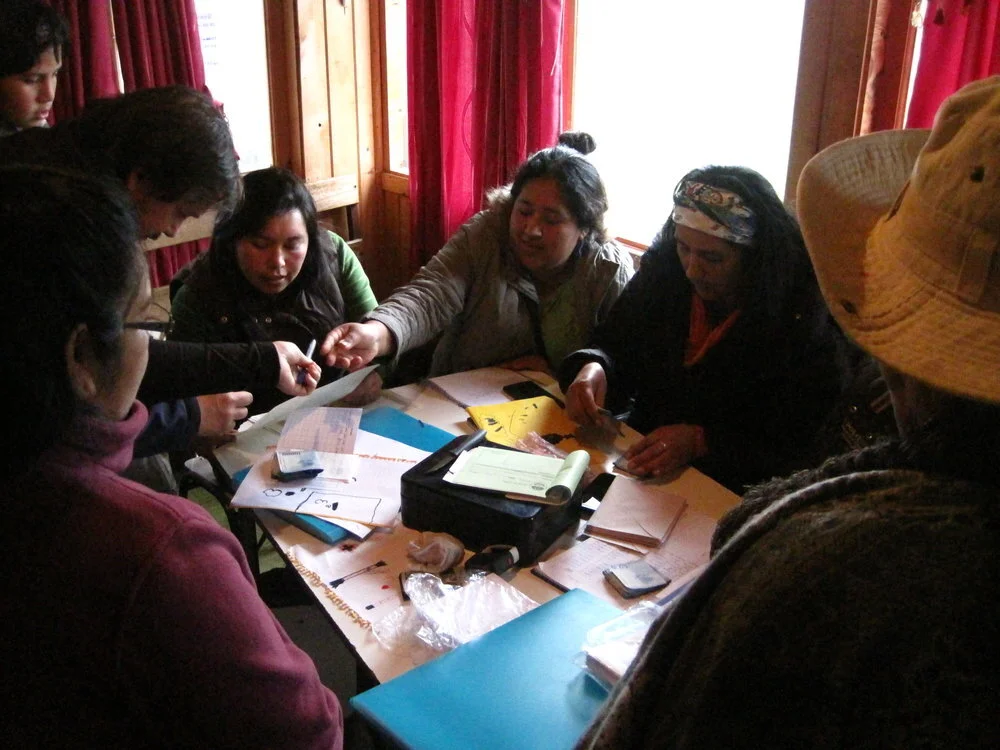multidimensional impact
Mutual Support Grupo Impact Evaluation Report 2014-2018
By Alison Guzman and Ignacio Krell
June 2020
Summary: After five years of the consolidation, Mutual Support-Rekülüwun can be seen as part of a repertoire of creative responses by Mapuche families to the monetization of their rural economies in southern Chile, which has accelerated notoriously in the last decade. The project was set out in 2012 by the Mapuche-Lafkenche community of Llaguepulli and MAPLE, to create a member-owned institution while abiding to an indigenous cultural context and community protocols.
Commissioned by Mapuche traditional authorities, Alison Guzman and Ignacio Krell, co-founders of the MAPLE Chile program and co-designers and advisers to Apoyo Mutuo Llaguepulli in the field since 2013, conducted in early 2019, an evaluation on the multidimensional impact of the Mutual Support-Rekülüwun. A community-led framework of Sixteen Strategic Directions elaborated in 2014 by Apoyo Mutuo’s management team, and validated by the project’s Council of Traditional Authorities, helped MAPLE Chile build the research based on priorities self-determined by the community. The report observations are based on qualitative and semi-quantitative data gathered in Lake Budi through mixed methods combining:
Qualitative Testimonies
Over 20 hours of recorded interviews conducted in early 2019
5 hours were transcribed and analyzed
Over 10 hours of video recordings
Semi-Quantitative Data
Database of members’ profiles
Data gathered through 5 years through participatory Monitoring and Evaluation.
Our hope is that this Impact Evaluation will enable a more informed appreciation of the change brought about by the community-owned financial tool to one small Mapuche Lafkenche community, on the shores of Lake Budi. Through dialogues under indigenous protocols, we hope collaboration between MAPLE Chile, Mutual Support of Llaguepulli, and other community partners and global allies will expand in research, interexchange, education, and relationship-building.
Key impacts expressed by members included in this Impact Evaluation are divided into four categories: economic, social, environmental and cultural.
Economic dimension: The Mutual Support Group generated an increased sense of security and financial independence, and a reinforced ability to balance monetary and non-monetary components of their family economies. Opportunities were created for longer term asset management, resulting in re-investments of their own family farms and initiatives which in turn has provided an opportunity to strengthen other non-monetary aspects of Mapuche Family Economies—both “tangible” and “intangible”.
Social dimension:The Mutual Support has also striven to be inclusive as part of the initial design. Non-monetary exchanges support young families while strengthening the social fabric of the community. The autonomous functions for saving, asset-building and investments, plus an empowered team, have also created socio-political cohesion and leadership through the ability to manage assets collectively in the context of decolonization of community economies.
Environmental dimension: The Mutual Support Group has provided a space to dialogue on how to create long-term environmental regenerative impacts while re-building Indigenous environmental governance and awareness. Just as important, is the connection the families, especially women, now have to access to self-managed loans to support initiatives to regenerate soils and cultivate native and organic foods, while restoring their territories.
Cultural dimension: Cultural values are transversal to all aspects of economic, social, and environmental goals of the Mutual Support Group.. Cultural impact can be observed in growing collaboration between families and different communities, revitalization of traditional economic cooperation and exchange, and important roles in this new context for Mapuche cultural authorities, protocols, and language. The Mutual Support Group today is seen as a Mapuche institution—where little emphasis is needed on western protocols and systems.
Watch video of presentation here!


